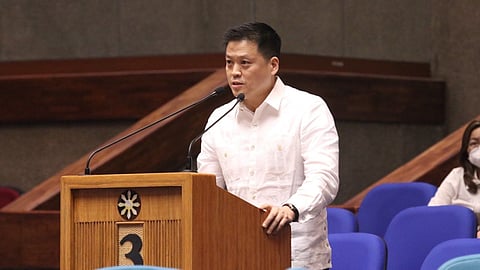
- NEWS
- the EDIT
- COMMENTARY
- BUSINESS
- LIFE
- SHOW
- ACTION
- GLOBAL GOALS
- SNAPS
- DYARYO TIRADA
- MORE

Department of Social Welfare and Development (DSWD) Secretary Rex Gatchalian has asserted that the agency’s role extends well beyond providing mere handouts.
“Social welfare provides immediate aid to help people navigate crises, but our focus extends to development programs designed for long-term poverty alleviation,” Gatchalian said. “While disaster response is also part of our mandate, it is not our primary focus.”
‘These centers are vital in ensuring that our mandate to protect the marginalized and vulnerable is fulfilled.’
The DSWD chief underscored the importance of a comprehensive approach to fulfilling the agency’s mission and implementing its programs effectively as he also stressed the pivotal role of achieving a strategic focus on development.
“Why focus on development? Because assistance should not only address immediate needs but also break the cycle of intergenerational poverty. For instance, the Pantawid Pamilyang Pilipino Program (4Ps) aims to tackle the root causes of poverty rather than just alleviating its symptoms,” Gatchalian said.
He also highlighted President Ferdinand Marcos Jr.’s directive for a whole-of-government approach, specifically targeting pregnant women and nursing mothers as under the “First 1000-day grant,” the DSWD will provide additional cash assistance to enhance the health and nutrition of children during their critical first 1,000 days.
The DSWD is also working toward full automation of the 4Ps system. Gatchalian noted that the program has led to success stories, such as bar topnotchers whose parents were 4Ps beneficiaries. “This August, we anticipate 300,000 beneficiaries will graduate from the program, demonstrating its significant impact,” he said.
Meantime, the “Walang Gutom 2027: Food Stamp Program” aims to eradicate hunger by teaching proper nutrition and directly supporting local farmers through a farm-to-table approach.”
“We want to eliminate middlemen and connect beneficiaries directly with local markets,” Gatchalian said.
In times of unforeseen crises, such as illness or displacement, the DSWD’s Assistance to Individuals in Crisis Situation (AICS) provides essential support. “Daily, thousands seek financial aid for medical bills, burial costs, food, and transportation,” Gatchalian noted, highlighting the program’s well-funded status but expressing hope for an increased budget.
To expand AICS services, the DSWD has partnered with hospitals, diagnostic clinics, and other service providers. The agency also runs centers and residential care facilities (CRCF) for vulnerable populations, including abused children and individuals with disabilities.
“These centers are vital in ensuring that our mandate to protect the marginalized and vulnerable is fulfilled,” Gatchalian said.
He also discussed “Oplan Pag-Abot,” which aims to support individuals and families in street situations through medical aid, food, transportation and livelihood opportunities.
With ongoing efforts to innovate and improve, the DSWD is poised to make even greater strides in the coming years, reinforcing its role as a cornerstone of social welfare and development in the Philippines.
“In all our initiatives, our goal is to empower individuals and reintegrate them into their communities through training and support, partnering with the Technical Education and Skills Development Authority and the Department of Labor and Employment to ensure effective reintegration,” Gatchalian said.
This holistic approach reflects the DSWD’s commitment to not only providing immediate relief but also fostering long-term development and resilience among the nation’s most vulnerable.
As the DSWD continues to advance its mission, the focus remains on expanding and improving its programs to better serve the Filipino people.
Gatchalian’s leadership has been instrumental in driving these changes, ensuring that the agency not only provides immediate relief but also fosters sustainable development and resilience among the nation’s most vulnerable.
With ongoing efforts to innovate and improve, the DSWD is poised to make even greater strides in the coming years, reinforcing its role as a cornerstone of social welfare and development in the Philippines.
